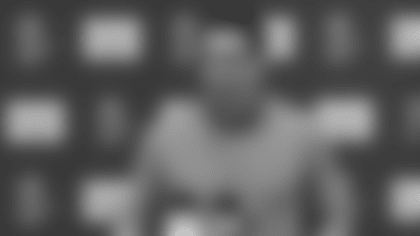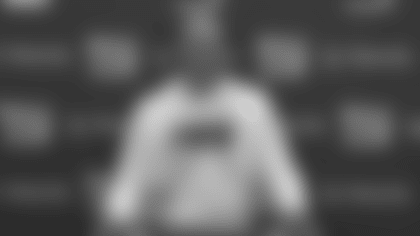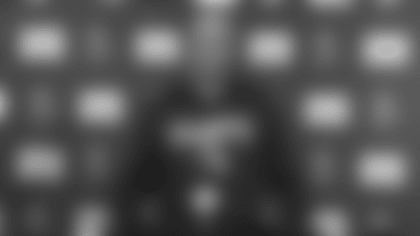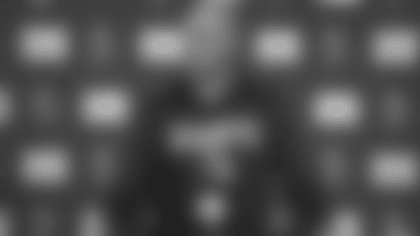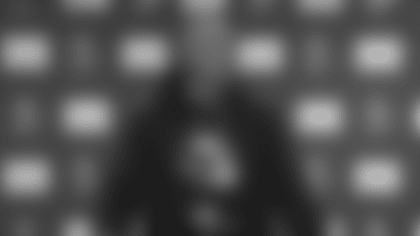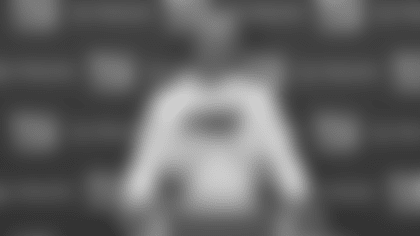Assistant Head Coach/Offensive Coordinator Mike Kafka
Q: Can you talk about what you saw in (wide receiver Malik) Nabers in his first NFL game?
MIKE KAFKA: Yeah, it was good to get him out there and give him some opportunities. He did a nice job with his opportunities. Let's continue to build on that in Week 2.
Q: I know you guys want to get him the ball. (Head Coach) Brian (Daboll) talked about it the other day more and more. The fans out there think it's probably easy enough to just throw it to him every time. What is the challenge and the dynamic of trying to not force it to him but increase those targets and try to, and he's obviously one of your most dynamic weapons.
MIKE KAFKA: Yeah, I think when you go through the game plan, you try and put guys in spots where they can be successful, whether it's a receiver, a running back, tight end, any of the position guys, skill guys that we have. And so, we think about that a lot. And then you look at some of the defensive structures that you could get out of that, the different types of coverages they could show. And then you're looking at kind of the strengths and weaknesses of those coverages. And for some routes, it works out well. For some routes, it's probably not as ideal. So, that's kind of the battle but then we have a bunch of dynamic guys on our team and in the skill room that they take away one thing, you got to make sure you reset through your progression and get to the next guy. So, all that kind of ties in as well not just with the routes, but with the protection and with the different schemes you want to show versus potentially different pressures, different front structures. So, there's a bunch of things that go into that, but that's what we talk about on a play-by-play basis.
Q: Daniel Jones talked about being more decisive. He is in his sixth season. How do you work on that this week?
MIKE KAFKA: That's what we talk about on the daily. Like every single day in the quarterback room, we're talking about your reads, your progressions, how you can get through those faster, seeing a movement key. Maybe it's a defender, maybe it's a spot on the field where you're looking for that void in the defense. So, those are things that we just talk about over and over and over again. And on top of core concepts and on top of new things that we want to install. So, it's just a work in progress.
Q: Daniel (Jones) threw a lot of balls in the dirt the other day, more so than you would normally see on not long routes. Is that a footwork issue or what's the deal with that?
MIKE KAFKA: It could be a combination of a lot of things. It could be pressure, rush. It could be timing. It could be route depth, like discipline. It could be just being a little bit further back on your drop or falling off your back foot. So, there's a bunch of things that kind of go into that. I'd say on the whole, like when we come out here and practice, we talk about finishing in a strong position, finishing with your back hip through, finishing those throws. And again, it's 11-man operation on offense. It's not just one person, but all of those things kind of affect it.
Q: When you looked at the film, was there any one common denominator you think that was going on there?
MIKE KAFKA: I wouldn't say one common thing that happened on every single throw. And playing quarterback in the NFL isn't easy. And I'm not making excuses for anybody, but the pocket's not always going to be clean. That's not the reality of it. A lot of times you're throwing off platform, you're throwing off balance. So, you got to practice that type of stuff. And then when you get the opportunity to go execute it, you got to hit. And if you don't, then obviously it looks bad, but when you do, and Daniel's been able to do that over the course of his career a lot of times. That's what we work for. So, we've got to make those things happen. Moving forward we're going to practice that.
Q: He mentioned specifically his footwork not being right at times. What did you see with that specifically? Was there one thing that you saw there that maybe he needs to fix?
MIKE KAFKA: Yeah, I know Coach (Offensive Passing Game Coordinator/Quarterbacks Coach Shea) Tierney has talked with him about it. I've talked to him about it. That's what we're going to work on today in practice. I won't say one specific thing, but it's kind of the accumulation of all the things and all the different schemes that we have in the run action game. When you're turning around, you're play action faking to the back, turning your back to the defense. Now you got to flip back around and find your movement key. Now there's a little bit of pressure. You got to slide, you got to push up. So just those details in working through your feet and every single play is not the exact same. Like we can go rep it 20 times on the practice field but in the game, it might be a little bit different. So, that's the repetition. We're trying to build a base and build kind of a library of all those movements. And then we can go replicate it in the game.
Q: What was your role on Sunday?
MIKE KAFKA: It was pretty much the same as it's been all year, just minus the play calling, but the communication up in the box, getting down, and working out and working through all those things on offense that we have to talk about in between drives.
Q: With the things you are talking about with Daniel, it almost seems a little bit elementary. Is part of that because he is coming off the injury and the layoff and needs those reminders. In his sixth year, it's a little bit surprising that he needs all of this redo?
MIKE KAFKA: Whether you're in your first year, your sixth year, your 10th year, your 15th year, you're always working on the fundamentals, and you've got to go back to that. So that's what you rely on. That's what we work on in the off season. We work on through training camp, all those little fundamentals. And so, once something goes wrong, that's how you problem solve it. That's how you self-correct is you lean on your fundamentals.
Q: How much pressure is on this offense this week specifically? We know what happened last year. Week 1 for a lot of people says, 'well, that's sort of like a carryover from last year'. So how much pressure do you take on this offense for them to actually score?
MIKE KAFKA: We're not focused on last year, we're focused on today. We're not even focused on last week. We have made those corrections. We talked about it. I think it was really good to see some of those guys that are new kind of step up and own it. And so that's where we're at right now. We're focused on today and ready to have a great Thursday practice, a great opportunity for us to get better today and a great challenge with Washington.
Q: The big thing that's being said publicly from Daniel's former teammates who played with him at times when he was at his best and from former quarterbacks who played the position like yourself is that he's playing like he's lost confidence. Do you see that? And how, behind the scenes, do you build up his confidence?
MIKE KAFKA: I'll say I haven't heard those references that you're talking about, but I haven't seen from my position, I haven't seen that in the meeting room, on the field. And again, it's an 11-man operation on offense. It's never just about one person. So, all 11 guys have to play as one. And today is a great day to get that fixed and worked out.
Q: You've been around the NFL a while as both a player and a coach, but have you ever seen a player like Daniel take shots like he kind of has? Not from analysts, but from former teammates, current players, former players, things like that.
MIKE KAFKA: Yeah, everyone's entitled to their opinion. I know myself, knowing D.J. and knowing the kind of guy he is, the type of worker he is. He's tough, not only just on the field, but I know he's got to handle all that. Being a quarterback, you have to deal with that stuff, whether it's good, whether it's bad. And so, being a quarterback, that's kind of your role a little bit. And same thing with being a coach, same thing with being a head coach, all those things. It's kind of your role in having to handle that kind of stuff. So, he's done it better than I've probably seen anyone else do it, especially handling some of the things he's had to go through with injuries and things like that. So, I'm proud of him for that. But Daniel's a tough kid. He handles it like a pro. He always has. He handles it like a pro in the meeting room. And I don't think his confidence has ever wavered since I've been here.
Defensive Coordinator Shane Bowen
Q: What did you think of your overall defensive performance?
SHANE BOWEN: There's a lot to improve on. Wish we wouldn't have gave up a few of those big plays in the passing game. Wish we would've been better there at the end of the game in the four- minute. Letting them run the ball was disappointing to me. Thought we battled. We started good. Really didn't make enough plays. They made them and we didn't, at critical times. We've got to continue to get out here and improve our technique and fundamentals and when plays are there, we've got to make them.
Q: What went into the decision to move (cornerback) Cor'Dale (Flott) into the slot?
SHANE BOWEN: I think we were just battling stuff throughout camp there towards the end. Just with the pieces and the comfort level of really where we were at with some of the other pieces. The familiarity for him playing in there, he's done it. So, really just navigating through some of the moving parts, dealing with some injuries there those last few weeks leading up to the game and where we felt most comfortable going into the game.
Q: Were you impressed with (cornerback) Dru Phillips?
SHANE BOWEN: I was. He did a good job when he was in there. Obviously his very first NFL play, forced fumble. Can't go much better than that. He'll continue to get a lot of work for us and hopefully he continues to improve and gets in there and finds comfort and creates a role for himself and continue to add value for us.
Q: With (cornerback) Nick (McCloud) banged up, how do you look at your second outside corner spot?
SHANE BOWEN: We'll see. We got (cornerback) Trey Hawkins (III). He's been here. He's been working with us. He kind of played that role last year a little bit. Obviously adding (cornerback) Adoree' (Jackson) is not quite as dramatic. So, we got some guys.
Q: Obviously defense is an all 11 (players) thing. I understand that. Do you believe that your two edge rushers, (outside linebacker) Kayvon (Thibodeaux) and (outside linebacker Brian) Burns, can take over a game?
SHANE BOWEN: I do. I do. I absolutely do. I got all the confidence in the world in them. I got confidence, obviously, having (defensive lineman) Dex (Dexter Lawrence II) in there as well. You mix in the rookie (defensive lineman Elijah Chatman), (outside linebacker) Azeez (Ojulari) at times, how it works out. I feel very confident in our ability to affect the quarterback with four guys.
Q: How much pressure is on that group? Do you think they need to do that in order for this group to get where you're going?
SHANE BOWEN: I tell them that every day. Where the resources are delegated, you got to be good. Your best players got to be good. It's the nature of the league. Your best players got to play their best every single Sunday if you want to play good. Offense, defense, special teams, whatever it might be. With that, they do. They have to go out there and perform. They're working hard every single day to improve, to get on the same page and make sure they're coordinated. This week's a little bit of a different animal with the quarterback. Again, there's expectations that come with the nature of the league.
Q: You didn't seem to get a lot of pressure on (Minnesota Vikings quarterback Sam) Darnold. What was the reason for that?
SHANE BOWEN: I think it was a combination of things. I think at times it was the chips, the ability to max protect and the flow of the game. There were some drop back situations. Other times it was more play action, keeping guys in. When we get those one-on-ones, we just got to win. We got to find ways to affect them, hopefully in the middle and on the edges. I tell all these guys, all 11 guys, we have to make the plays when they're there for us. We got to win our one-on-ones. We got to find ways to win our one-on-ones.
Q: You're talking about (outside linebacker) Brian (Burns) and (outside linebacker) Kayvon (Thibodeaux) being able to take over games. How do you think they did in the opener?
SHANE BOWEN: I think there were good plays and there were some that they need to improve on. There were plays where they factored (in), there were plays where they were around the quarterback and they were close to the quarterback. I thought Burnsy (Brian Burns) could have had a strip sack on one where he spun inside. KT (Kayvon Thibodeaux) was wrapping around, matched the hand on the DPI (defensive pass interference) they called on (cornerback) Adoree' (Jackson). KT (Kayvon Thibodeaux) got another hit wrapping around. Just consistency across the board I think has to improve. But there were good and bad with really everybody.
Q: With Kayvon (Thibodeaux) in particular though, he was credited with just one quarterback hit. How can you sustain that throughout games if that's going to be his contribution?
SHANE BOWEN: I would say it's game one. It's game one. I don't think that's the level of contribution that he expects from himself or any of us. It is what it is. But again, when the plays are there, we got to be able to make them. When they're not there, we can't force our hand and do stuff that's reckless with the defense just the same. He's got to play within the system, which he's done a good job of. Again, just like I tell all these guys, all 11 guys, when the plays are there for you to make, you got to make them. That's the expectation. When you get one-on-ones, coverage, rushing, whatever that might be, find ways to win. You're not going to win all of them. They (the other team) get paid too. Find ways to win. Really, at other times, we got to be able to impact outside of the scheme a little bit, outside of those situations.
Q: What have you seen from (Washington Commanders quarterback) Jayden Daniels?
SHANE BOWEN: Explosive. He eats up grass. If he gets loose and he gets vertical, he's eating up grass in a hurry. Led them in rushing. I think he had 88 yards rushing. I think he was decisive with getting the ball out. He went 17 of 24. Passive rating was above 90. Had a really good first game, in my opinion, for a rookie to go out there and do what he did. Talented. We're going to have to be ready for everything from being able to match and cover to also being able to keep him corralled and not let him get loose on us.
Q: You used (outside linebacker Brian) Burns in an off-ball linebacker on a handful of snaps. What went into that and what you saw from using him in that role?
SHANE BOWEN: Just changing the picture. Trying to create some favorable matchups at times. Things we felt like we could get him one-on-one with some guys inside, potentially. Teams are trying to chip him and get four hands on him on the snap. Just another way to try to free him up, give some different looks. Again, doesn't really change a whole lot for us in the unit because there's all the same things we can do back end-wise in that regard. Really just trying to give another look.
Q: (Safety/inside linebacker) Isaiah Simmons was frustrated he did not play on defense. Why wasn't he in the game plan in week one?
SHANE BOWEN: I expect Isaiah (Simmons) to play this week. I'm glad he's frustrated. They should be frustrated. They should be disappointed. I hope they use it as fuel to come out here and improve and get better. And he has. He's approaching it the right way. I've been proud of him with how he's responded. We're going to get him in there. He's going to have his opportunities. When they come, he's got to make the most of it.
Q: Are you going to have to make staff adjustments with (Outside Linebackers Coach) Charlie (Bullen) with the broken leg?
SHANE BOWEN: Yeah, it's unique. He had surgery this morning. He's texting already. There'll be some things. I think we'll probably move somebody down from the box to help with that group throughout the game with rotation, with everything else that comes into play. Obviously, I'll be involved a little bit more over there. It's a tough deal. I hate it for Charlie (Bullen), but I know he's fighting like hell to get back out here.
Q: When (defensive lineman) Dex (Dexter Lawrence II) is dominating the way he did from the jump, after the fact, is there a regret that, 'We need to play off of that? We need to take advantage of that?' It seemed like they couldn't block him. I would imagine that's going to be just about every team.
SHANE BOWEN: I hope that's the case every week. Dex (Dexter Lawrence II) is going to be a handful for a lot of guys in this league, whether it's one or two guys. He has a knack for winning versus two, which is extremely rare. If they're putting four hands on him and he's still winning, that means we've got a lot of one-on-ones on the other side. We've got to be able to win those. Hopefully, at times, that will result in maybe them having to get four hands off of him, to free him up. It goes hand-in-hand. It goes both ways. Finding ways to create for him, always, and knowing if we don't, he can still factor, is exceptional for a coordinator.
Special Teams Coordinator Michael Ghobrial
Q: What did you think of the kickoff return in action now that you were able to see it in a regular season game?
MICHAEL GHOBRIAL: Between our game and then the rest of the league, you saw a little bit more variety in terms of the return concepts and you saw how people were going to use their personnel a little bit just in terms of matchups. There was definitely a little bit more variety than there was in the preseason. I think you're still seeing the same issues in terms of ball handling, in terms of block destruction. It's a lot of good tape to show our guys in terms of improving them with obviously ball security and then improving the block mechanics and improving the block destruction.
Q: It seems like there's so much more risk to asking somebody to return it from the kickoff perspective. Do you think it will eventually get back to where it was, just booming it out of the endzone, taking it up to the 30 and we're good?
MICHAEL GHOBRIAL: To your point, there is a little bit of risk because you're seeing that there's- I remember last week one of the questions was there's not as many layers so there's no security blanket for somebody to overcome maybe a misfit by a coverage guy. If you scheme it up correctly and guys truly understand where they fit in the scheme, there still are elements to covering kicks because there's a momentum aspect to it when you do cover kicks properly. When that defense takes the field and they see a tackle inside, probably now the 25 whereas the old rule was inside the 20, I think that defense takes the field with some juice. Obviously, you guys know in our stadium, especially when it gets a little bit more weathered, kicking a touchback won't be an option at some point. I think for us and across the league people still have to work on covering kicks and especially with the teams here in the Northeast.
Q: Do you almost anticipate, there have been rumblings the league will see that touchback number go up and all of sudden the ball is moving back. They still want to have that purpose of making it a live play for you guys. Is that almost one of those things that we got to do what we've got to do now and not worry about what's coming next as far as this rule goes?
MICHAEL GHOBRIAL: Yes, definitely. If the NFL changes the rules in terms of that, then the strategy potentially changes. What are the consequences to kicking a touchback now? I don't know. We're going to play it as it is right now and then obviously figure out what our best strategy is as we start to trickle down more and more in the season.
Q: What did (wide receiver) Ihmir Smith-Marsette show you in his tryout and whatever you saw on film that you wanted him here for a tryout?
MICHAEL GHOBRIAL: I didn't realize how big he was until I saw him in person. He also has real, real speed. Like real speed. Obviously, he's scored in this league before, so to see that type of production and to have him here is awesome. We'll continue to work him and continue to make sure that he's the best option in terms of securing the ball, which is number one priority for us.
Q: How big a curveball was (wide receiver) Gunner (Olszewski) getting hurt pregame? Obviously, you wouldn't have left yourself in that spot if you thought there was a chance that was going to happen, so what kind of curveball?
MICHAEL GHOBRIAL: It was unfortunate that it did happen in pregame. You always have contingency plans, not just at the returner position, but at any position. Who is your next person in? But it was unfortunate. But not to say that it's our job to get other guys ready in depth positions. You're not necessarily carrying a huge roster like you are in preseason, so the options become a little bit more limited, but it just shows you that these guys and it's our job to make sure that they're prepared to go in and execute if their number gets called.
Q: What made (wide receiver Darius) Slayton the next man up?
MICHAEL GHOBRIAL: He showed us the best ability to make smart decisions and to safely secure the ball. Obviously, we felt convicted as a staff that he was our next best option.
Q: In 20/20 hindsight, what decision does he make once the ball bounces?
MICHAEL GHOBRIAL: In that situation, what ended up happening was the punter basically hit the ball outside of his foot, so you're not getting the traditional hang time where a returner can truly get under it. So, the ball, if you just took a look at the endzone copy of the film, initially looked like it was going to his left, and then it curved hard right because it was off the side of the punter's foot. So, when that nose started to come down, it came down with a lot less hang. So, he's in kind of like a middle point where, do I try and catch it, do I not? But the second that ball hits the ground, we just need to get away from it and make sure our punt return unit's away to ensure that ball doesn't hit one of our players or we're potentially fumbling around with it. And then if it gets a roll, it gets a roll in that situation. We just got to make a smarter decision and that's something we obviously talked about.
Q: Why did you settle on the running backs as your kickoff returners?
MICHAEL GHOBRIAL: Earlier in the year and then during practice, we've seen good catch mechanics with them with their ability to catch it forward and be able to track some of those low liners. Their run skill is obviously a huge benefit. Obviously, those guys are used to having the ball in their hand. They're used to understanding the importance of ball security and you see that kind of with their collision balance and their ability to navigate through the coverage since I think a lot of us would agree that that return is looking more like offensive run game. So, the vision of those running backs and their ability to see which gaps open up and which way to press stuff, those are all important for any return but running backs, it just so happened that they had the best opportunity with our team to be able to show success with that.
Q: With (punter Jamie) Gillan, what did you think of his Week 1 performance and his training camp? And his consistency?
MICHAEL GHOBRIAL: I thought (punter) Jamie (Gillan) has had a great camp and then obviously to see him have that type of success in game one, which I do think he had a really good game for us. When you have a punt coverage unit that nets 46.2 that's going to put you in the top of the league. That starts with the snap with (long snapper) Casey Kreiter and then it goes into the punt with Jamie. Jamie was able to put his foot on the ball and was really able to flip the field multiple times. I know the one that stands out in everybody's mind, which was an awesome play by multiple people, was when we pinned the opponent on the one-yard line. In that situation, the touch of a punter's foot is critical because he's on the plus 40-yard line and he's used to hitting the punt a little bit further and you're almost flirting with disaster. If you kick a touchback, you're going to net 20 yards. He trusts his preparation. He's a true pro. He prepares the right way. It was really cool, one aspect, that you guys saw obviously the success of that play and the genuine celebration for the teammates, which I'm just replaying it back in my mind. On Friday, that same exact play happened in practice. The same thing happened, but now (wide receiver Bryce Ford-Wheaton) BFW pinned him in and you just saw everybody rallying to BFW to celebrate that. It took a bounce, all this, that, and then (linebacker) Ty Summers was the one who initially tapped it back in and then it was hot potato after that. It just goes to show you that they prepared for that moment, and they executed in that situation. To go back to your point, Jamie has done an awesome job in terms of handling his business.
Q: How much is instinctive from your guys? And how much of it is stuff that you drill because one misstep and the play is over.
MICHAEL GHOBRIAL: It's our job as coaches to try and put them in as many situations that's as close to the game as possible. There's different ways to put them in that situation. It could be in practice, it could be in the film room, it could be in walkthroughs. Then showing them when their opportunity presents itself, they want to be ready. There is an element of instincts, but number one, it's knowing the rules, which the offseason was a huge component of that. Then number two, the execution part of things comes to life. In practice, drilling that and understanding, 'hey, if BFW wasn't here, you've got to be ready for this opportunity'. Then being able to gather that information, you mix the instincts, the knowledge that they learned, and then the execution. You get plays like that and hopefully we're getting a lot more.
Wide Receiver Malik Nabers
Q: What is this game like for you being on the opposite side of (Commanders quarterback) Jayden Daniels?
MALIK NABERS: It's the same football game. It's just we're on different teams.
Q: What has it been like between you guys this week? Are you guys in constant contact? Are you guys talking to each other? You guys shut it down this week?
MALIK NABERS: The relationship is still a brotherly relationship, so what we do is what our job is, but we've got a different relationship off the field.
Q: What did you take out of Sunday's game for yourself personally?
MALIK NABERS: Just another day to go out there and show what I can do.
Q: What did you maybe learn out of the game you just played?
MALIK NABERS: It's a lot of things to work on, a lot of things to get better at, continue to strive for greatness and just keep the weeks on going.
Q: What makes Jayden such a good quarterback?
MALIK NABERS: He's a smart quarterback, a great team leader. His running ability is great, arm talent is crazy, so I'm excited to see what he does this week.
Q: I think Jayden said he talked to you earlier this week. What are you guys' kind of talking about? What's the discussion?
MALIK NABERS: We talk about the game, just talk about just football, but like I said, we've got a relationship off the field, so it's like we're going to talk smack when we play on the field, but off the field, it's a brotherly relationship.
Q: Have any of your defensive teammates come up to you and ask for inside information on him?
MALIK NABERS: Of course, yeah. That's something that you've got to share when you're going against your old teammate, but any way to get the win.
Q: Has the coaching staff?
MALIK NABERS: No, not the coaching staff.
Q: Can you appreciate how you guys helped each other get to where you are? Maybe if he's not as good as he is, you're not here, and if you're not as good as you are, he's not the second pick. Can you guys appreciate how much you helped each other?
MALIK NABERS: Yeah, for sure. Without him, I probably wouldn't be here right now, so having that guy as my quarterback, it took a lot of stress off me, so I took a lot of stress off him too getting open. But we're in a different space right now, but it's still the same game.
Q: How eager are you to have a deep ball and make a play downfield? We saw it all summer, obviously not in the first game.
MALIK NABERS: I'm excited just to have the ball in my hands any way possible I can get it. If it's a deep ball, it's a deep ball, but whatever ways to give me the ball, I'm happy for it.
Q: I bet you're learning to be patient. I'm sure you probably want the ball in your hands all the time. I know the Giants fans probably want the ball in your hands all the time. How do you handle that, the flow of the game?
MALIK NABERS: It's not that you can really handle it. I mean the game is not going to always go how I want it to go. If I can have the ball in my hand 20 times, I would like that. But how many times the ball gets thrown my way, I can't tell you how many times I'm going to get the ball this game. The game is the game.
Q: How did practice go today?
MALIK NABERS: It went great. I got to move around a lot. It was a good day.
Q: Are you seeing signs of progress on the practice field this week from what you saw Sunday?
MALIK NABERS: Every day of practice you're always going to have progress. You've got to wait until game day to see how you actually play. Every day in practice is going to look good. You're going against the scout team, plays are going to look good, but it all matters when you're playing another team.
Q: What were you most satisfied with what you did last Sunday in your first go around?
MALIK NABERS: I didn't flinch. I kept running every route, got open, made some great catches, made some great plays, and showed my teammates, my quarterback and the coaches that they can trust in me.
Q: What were the things, conversely, that you would have wanted to do better that you worked on?
MALIK NABERS: Probably blocking more, probably understanding my assignment more.
Q: You've talked so much about your competitiveness. How did you process your first NFL loss and the way your team was beat?
MALIK NABERS: It took a few days, but this is the National Football League. You're going to lose. You're never going to have an undefeated season like you got in college. You're always going to lose a game, but it's how you bounce back the next week. It's how you face adversity.
Q: What have you seen from the Commanders secondary on film?
MALIK NABERS: They've got a great secondary, they've got a lot of key factors in their defense that they like to put out on the field. But we're going to continue to do what we do.
Q: Have you gone up to (Head Coach Brian Daboll) Dabs and say, 'you want me to call the first play'?
MALIK NABERS: No, I'm going to let Dabs handle all that.
Outside Linebacker Brian Burns
Q: What is unique about this game plan when you have a quarterback who can, if you're too aggressive off the end, tuck it and run around you?
BRIAN BURNS: It's tough. You got to have eyes on him. Like I said, you don't want to rush him too safe and not get any pressure and then he'll tear you up from the pocket. But you also don't want to be too reckless, and he'll tear you up with his feet. It's going to be a group effort along all our guys, the D-line and the linebackers, to keep eyes on him and to keep him contained. But for the most part, we still got to go out there and throw our moves in and win.
Q: What was your first impression of (Washington Commanders quarterback) Jayden Daniels? Like, obviously, I'm pretty sure, when you watched the tape it was probably the first time you've seen him extended.
BRIAN BURNS: Fast is the first thing I thought. And secondly, he looks confident. The way he plays, he exudes some confidence. Even after a couple bad throws I've seen him make on film, it's like he brushed it off like it never happened. So that type of confidence is what you look for in a quarterback and I think he has it at an early stage.
Q: I imagine your focus has to be to take that confidence away, right?
BRIAN BURNS: Yeah, we got to rattle him as much as possible, have bodies around him, be in his face and make it uncomfortable. At the same time, you got to keep eyes on him and try to keep him in a well because he did have almost 90 yards of scramble yards and that is demoralizing for a defense, especially if the back end's doing their job. It's demoralizing.
Q: You said something a minute ago about having a rush plan in Carolina and not getting to it much. I assume that meant because of the scores, right?
BRIAN BURNS: A lot of things, but yeah.
Q: So, my question was going to be how much of your rush plan did you not get to on Sunday because you guys were behind?
BRIAN BURNS: No, we got to our rush plan in a couple instances. I just would say that they held true to their chip looks. They always had a guy coming out the backfield and they always had a tight end or somebody in the area because they have to keep four hands on (defensive lineman) Dex (Dexter Lawrence II). So, to try to neutralize the edge and neutralize Dex (Dexter Lawrence II), they kept more people in protection than most.
Q: You've talked all summer about how impressed you were with Dex (Dexter Lawrence II) in practice. What you knew of him after Sunday and watching him in action, how did that more so become a factor for you seeing how good he was?
BRIAN BURNS: I kind of always knew. Practicing with him, I can see it. One-on-ones, I can see it. Dang near 100% on one-on-ones. I don't know. Dex (Dexter Lawrence II) is a unique player. Never seen it before.
Q: What do you think of his sack dance?
BRIAN BURNS: Oh yeah, you know I had to get in on it. Yeah, it's a clip of me doing it with him.
Q: I know…
BRIAN BURNS: Oh yeah, for sure. It's tough. I did it in Carolina, actually.
Q: You did his?
BRIAN BURNS: Yeah. I got a sack against Detroit. I think my second sack against Detroit, I hit his dance.
Q: For him or a sign a respect?
BRIAN BURNS: No, we were just goofing around in practice one time. I think the Giants media team had released some video of all his teammates trying to do it. So, me and (Carolina Panthers inside linebacker) Shaq (Thompson) was just doing it because it was funny. And we trained with Dex (Dexter Lawrence II) like two years prior to that. So, I had a relationship with him. But I don't know, we just did it one time in a game just because it was funny.
Q: So, do you expect him to kind of return the favor if you get one?
BRIAN BURNS: Oh, he already said he's going to do it. I just told him to make sure he stretches. I don't need him hurting himself doing my celebration. He got to stretch for that.
Q: You had a couple snaps where you were an off-ball linebacker. How much have you done that in the past?
BRIAN BURNS: I did it quite a bit in Carolina. This one was a little different because I was actually reading a lot of blocks and pullers and what not. I was actually an inside linebacker for a bit. But I feel like there's still plays to be made even in that position, that I can make. I feel like the more I fine-tune that, the more I detail that up, the more plays I can make in that area. I feel like there's definitely plays to be made.
Q: I was going to follow that up by saying, does that make the most of your athleticism in that role?
BRIAN BURNS: It does.
Q: Oh, it does?
BRIAN BURNS: I think it does. It's definitely ideal for me to go forward and then go after the quarterback, of course. But I made a couple plays in that position, that game, but I also missed a couple that I feel like could have been game-changing. Like I just said, for me to just detail that up and make the most out of those opportunities is what I'm focused on.
Q: You play a guy like (Washington Commanders quarterback Jayden) Daniels spying seems to be out of date these days. Is he a guy who can bring that back?
BRIAN BURNS: I feel like we put the responsibility on the D-line first. And if it's needed, if it's getting a little out of hand, then yeah, probably somebody could watch him. But I think it'll be on the D-line first for sure.
Q: Does he remind you of anybody that's played that position?
BRIAN BURNS: Maybe like a (Arizona Cardinals quarterback) Kyler Murray. I see him more in that range. He outruns a lot of guys side to side. I wouldn't really necessarily say (Baltimore Ravens quarterback) Lamar (Jackson), maybe from more of a stature standpoint, Lamar (Jackson). But as far as how he runs, it's more of Kyler (Murray). It's side to side, outrun you, run outside, out the back of the pocket, wide through the B-gap. Lamar (Jackson) is more of a one-cut downhill. He's more calculated with his runs, but he's also older. But yeah, I would probably say Kyler (Murray).
Q: Right now, what does he do best that you've seen on tape?
BRIAN BURNS: It's just been one game. Like I said, I feel like they play to his strengths. A lot of RPO, read option, get the ball out quick, screens and designated QB runs. They play to his strengths. But using his athleticism is definitely something that they're capitalizing off of.




